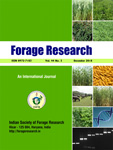GULAB PANDOVE*, VIDHI ARORA AND AVTAR SINGH
Punjab Agricultural University, Regional Research Station, Bathinda-151001 (Punjab), India
Department of Microbiology, Punjab Agricultural University, Ludhiana-141004 (Punjab), India
*(e-mail : gpandove@pau.edu)
(Received : 23 April 2023; Accepted : 20 June 2023)
SUMMARY
There has been undue pressure on the agricultural sector to meet thefodder demand of the burgeoning global livestock population along with the augmentation in the abiotic stresses like
pH,salinity, temperature etc. In addition, the natural resources are limited due to which has become a major concern for the developing nations to enhance forage yield per unit area. There has been a continuous use of chemical fertilizersto combat aforesaid moot issues. However, the deleterious effects of chemical fertilizers on the environmentand stagnation in the further improvement in yield per hectare urged to look for new promising, renewable, economical and eco-friendly technology.The rhizospheremicroorganisms play a paramount role in maintaining soil fertility and in biogeochemical cycles. The advantageous free-living rhizospheric bacteria are known as plant growth-promoting rhizobacteria (PGPR). These are increasingly available in markets as microbial inoculants and these are the potential alternative for mainteneance of soil health and enhancement of yield. Various formulations of microbial inoculants are available in the market. Therefore, in the present review, an overview of microbial inoculants has been discussed to sensitize agriculturists about the benefits of microbial inoculants.
Key words: Abiotic stress, formulation, microbial inoculants, plant growth promoting rhizobacteria, rhizospheric bacteria

